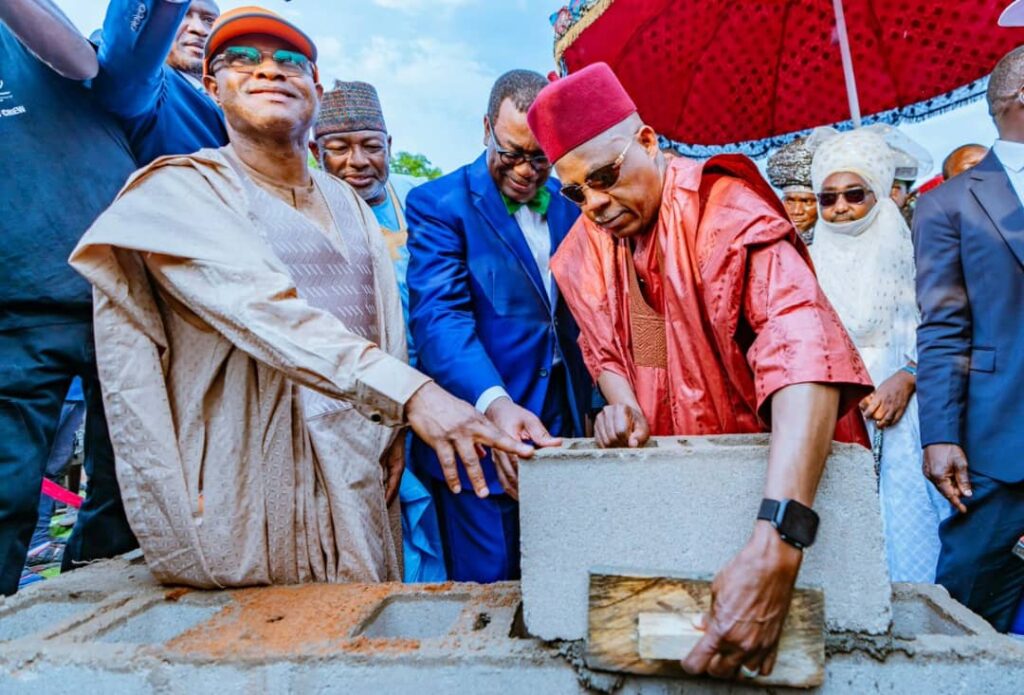Vice President Kashim Shettima has launched the construction of Phase 1 of the Special Agro-Industrial Processing Zone (SAPZ) in Kaduna State.
During the launch yesterday, he described the initiative as a “presidential priority project” aimed at transforming Nigeria’s agricultural sector and generating sustainable employment nationwide.
Performing the groundbreaking ceremony at Daki-Takwas, along the Kaduna-Abuja Expressway in Chikun Local Government Area, Shettima highlighted the project’s potential to tackle longstanding challenges in Nigeria’s agricultural value chain — including poor infrastructure, limited market access, and minimal value addition.
“This is more than laying bricks and mortar,” Shettima said. “It’s about empowering our farmers, energising our youth, and laying the groundwork for inclusive economic growth. We are building the infrastructure to feed our people and fulfil the promise of our nation.”
The SAPZ initiative, spearheaded by the federal government with support from international development partners such as the African Development Bank (AfDB), Islamic Development Bank (IsDB), and the International Fund for Agricultural Development (IFAD), is being rolled out in eight pilot states — Kaduna, Kano, Kwara, Cross River, Imo, Ogun, Oyo — and the Federal Capital Territory (FCT).
Designed to integrate farmers with processors, reduce post-harvest losses, and boost rural economies, the SAPZ programme will create agro-industrial hubs that attract private sector investment and foster innovation in agricultural production and processing.
Emphasising the importance of youth involvement in agriculture, Shettima noted, “The youth of Nigeria must not be spectators. They must be stakeholders and shapers of their own futures.”
He praised the Kaduna State Government for its agricultural leadership, calling the state a “model” for others due to its vast arable land and historical role in farming.
“Kaduna is not a stranger to agricultural leadership. What we are starting here today will become a model for other states to follow,” the Vice President said.
However, Governor Uba Sani of Kaduna described the SAPZ as a strategic investment that aligns with President Bola Ahmed Tinubu’s commitment to economic transformation.
“The SAPZ is a huge investment that will position Kaduna as a major player in Nigeria’s industrial development,” the governor stated, revealing a significant increase in agricultural budgetary allocation — from ₦1.4 billion in 2023 to ₦74.2 billion in 2025.
Dr Akinwumi Adesina, President of the AfDB, commended the government’s resolve in bringing the long-anticipated project to fruition, noting that the SAPZ initiative has taken over a decade to realise.
“The fastest way to develop Kaduna is through agricultural industrialisation. It’s taken us eleven years to get here, but I am thrilled we are finally breaking ground,” Adesina said, adding that AfDB has committed over $934 million to SAPZ programmes across Africa, with another $938 million raised from development partners.
Also speaking, the Minister of Agriculture and Food Security, Senator Abubakar Kyari, hailed the SAPZ as a “game changer” that will attract private sector investment, enhance rural development, and drive value addition in the agricultural sector.
“This programme will strengthen Nigeria’s agricultural ecosystem and help us rise to the challenges of our time,” he said.
More so, the Emir of Zazzau, Ambassador Ahmed Nuhu Bamalli, expressed heartfelt appreciation on behalf of the people of the state, describing the project as a timely and welcome intervention.
The ceremony drew a high-profile gathering, including former Vice President Namadi Sambo; Kaduna Deputy Governor Dr Hadiza Balarabe; Minister of Environment Balarabe Lawal; Minister of State for Industry, Trade and Investment Senator John Enoh; members of the National and State Assemblies; and the National Project Coordinator of SAPZ, Dr Kabir Yusuf



